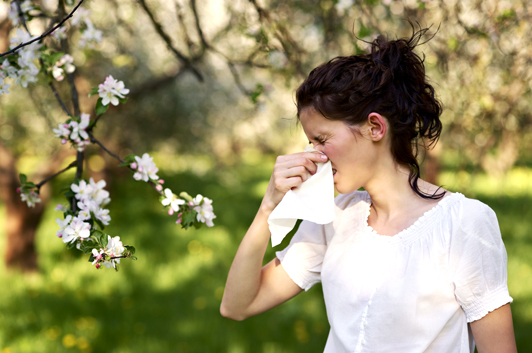
Seasonal Allergies
Most people who suffer from seasonal allergies (aka allergic rhinitis) will tell you there is almost nothing worse – eyes itching and watering, nose dripping, sneezing – it doesn’t stop. You look sick, you feel sick, but you’re not technically “sick”. And while the rest of us are enjoying the sun and warm temperatures of the early spring, you are just dreading the onset of your yearly allergies.
How severely you react to environmental allergens can be based on various factors – total pollen count and the particular species in your area are obvious ones. But what many people don’t realize is that if your immune system is already operating at a certain level of over-activity, you may be primed to react.
With patients, I use the analogy of your body as a bucket with various small taps placed at different levels, allowing slow drainage. And as long as the inflow (the things coming in that your body has to process and excrete) isn’t more than the drainage capacity, then everything works fine. But if there are too many things filling up your bucket, eventually it’s going to overflow, in the form of allergies. These inputs can include underlying food sensitivities, chronic inflammatory conditions, and poor diet and sleep habits.
Allergy medications have come a long way in how effective they are at controlling symptoms; just one pill a day can keep everything under control. However, many of these drugs carry their own side effects including drowsiness and interaction with other treatments. I still get lots of patients telling me they don’t want to have to take drugs every day just to feel normal. So what are your options?
Keep your “drains” open and flowing. Support your body’s natural elimination pathways, including kidneys, liver, lungs and skin. The human body is made up mostly of water – so make sure you’re drinking plenty of it. A general rule of thumb is to aim for two litres a day, more if you’re drinking caffeinated beverages. As well as water, insoluble fibre in your diet keeps bowel movements happening regularly. Engage in regular deep breathing exercises – as well as getting rid of the carbon dioxide, this has the added bonus of decreasing the effects of the chronic stress that everyone is experiencing daily. And try to avoid clogging the pores of your skin with “beauty” products and harmful anti-perspirants. Acupuncture has also been shown to be an effective treatment to ameliorate symptoms.
Reduce your inputs. Avoid your allergy triggers whenever possible. Invest in a good HEPA air filtration system appropriate to the size of your living area. (At the very least, get a good one for your bedroom). At the height of pollen season, don’t bring your pollen-laden clothing any further into your house than necessary. Consider dropping it at the door if this is an option. Shaking it out outside, doing laundry more frequently, showering (or at least rinsing your hair) before bed – these are all ways to keep it out of your bedroom, where most of us spend the majority of our time while at home. Consider looking into any food sensitivities that may be contributing to underlying inflammation.
Choose a few good quality supplements. This is where visiting your naturopathic doctor comes in. In fact, what you’re already taking may be adding to the inflammatory burden. We’ll help decide which will help and which will just be a waste of your money. A few of the ones we’ll consider – omega-3 fatty acids/fish oils, probiotics, quercetin. But not all supplements are created equal, so either do your research or consult the experts.
Is this the year you’re finally going invest the time and effort into taking care of your allergies? Make your appointment to come see one of the doctors here at Yaletown Naturopathic Clinic.






Leave a Reply
You must be logged in to post a comment.